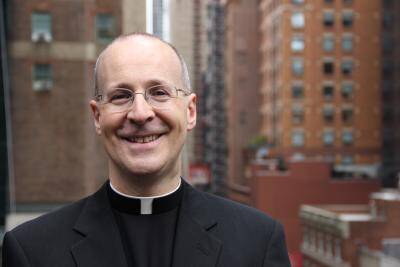‘If you want to meet the poor, take the bus.” That’s a saying I’ve heard many times from my brother Jesuits. It refers not so much to transportation within cities (though it certainly could) as to long-distance travel. My own preference, especially here in the Northeastern United States, is traveling by train: in these parts Amtrak is quick, reliable and relatively inexpensive if you plan far enough in advance. As for planes, well, to be charitable, I’ll pass over that in silence. But generally speaking, those who are poor and need to travel from city to city take neither the plane nor the train—but the bus.
So a few months ago, when I was invited to speak at an event sponsored by the Sisters of St. Joseph in Springfield, Mass., I happily accepted their suggestion to return to New York City by Greyhound bus, or “the Dog,” as some of my friends call it.
Before continuing this tale, which takes some surprising turns, I would like to say three things. First, I love the Sisters of St. Joseph, no matter where they are—from Springfield, Mass., to Chestnut Hill, Pa. Second, I admire women religious in general: they are my heroes. Third, on that particular Sunday, there was only one convenient way to travel from Springfield to New York: the bus. The trains were not running at that time, and of course I don’t own a car; so when a bus ticket was offered, I eagerly accepted. In short, none of what I’m about to recount was the “fault” of the generous Sisters of St. Joseph.
In any event, after my afternoon talk, a friendly S.S.J. dropped me off at the Springfield bus station. The sisters had even packed me a nourishing dinner in a brown bag: a ham sandwich, a ginger ale, a bag of peanuts and a banana. I located a comfortable seat on the bus, took out the latest copy of The New Yorker from my backpack and looked forward to an enjoyable and economical drive back to New York on the Dog.
But it was not to be. Directly behind me were two people who, it soon became clear, were a prostitute and her pimp. (I’m not sure if “pimp” is still the correct term: I’m not up to date on prostitution slang.) From the moment the bus pulled out of Springfield station, the two started arguing loudly. The woman was furious at the man, who was also her erstwhile boyfriend. She recounted in lavish detail his cheating on her. For a good hour she shouted, over and over, “Stupid! Stupid! Stupid!” while hitting him. In response to her invective and her punches, he unleashed his own fusillade of foul-mouthed rage, all the while dropping the “F-bomb” liberally.
Since the bus driver seemed largely unconcerned, I thought of saying something. At the time, I was in my clerical collar, and so I thought perhaps a glance might effect some sort of change. But given that the two of them seemed as high as kites, I figured that they might (a) have a gun, (b) freak out and punch me or (c) have a gun, freak out, punch me and then kill me. So I figured I’d wait it out. How long could it last, anyway?
It lasted the entire trip.
But in the midst of this seedy drama was grace. Sitting beside me was a dark-haired, middle-aged woman, wearing a white nurse’s uniform, who read her Bible through the entire trip. She gave no indication that the commotion from behind us bothered her at all.
As the Dog raced on through the night and the two continued their very public battle, my traveling companion calmly pored over her Bible (Romans, I noticed). Once again, I was reminded that the poor put up with such indignities all the time. It filled me with admiration for the woman seated next to me, and I wondered if her serenity might not be the result of long experience. It was probably not the first, or last, time she would endure something like this.
Talking about “the poor” is very often misleading. They are, after all, individuals, as was the woman on the bus. So it’s often inaccurate to generalize, and say, “The poor are like this.” On the other hand, many are the things we can learn from people with personal experience of poverty. Many are the experiences that they take for granted that others would find intolerable. In their patience, in their fortitude, in their dignity and in their hard work, the poor can often be our models. And so blessed are they.
Women religious, then, aren’t the only women who are my heroes. Now I have a new one: the woman who sat beside me on the Dog.









Happy to read about Fr. Martin's support of the Springfield SSJ's who got me thru 8 years of Catholic education in the post-Vatican II 60's relatively unscathed. He seems to be learning -albeit a tad late in life- what many of his heroic women religious and some fellow Jebbies have known for years: the poor ride the bus. I was a bit surprised by his naivete in thinking his Roman collar might effect some kind of social change on the bus, instead of pulling out what has been his strongest suit: his sense of humor. During my own lengthy Greyhound jaunts (from central Florida to the Trappists in Georgia and even boarding school days when I changed coaches in Springfield to head to the Berkshires just a stone's throw away from the Jesuits' Cranwell in Tanglewood town) I always found that a well-placed bit of jocularity or a shared snack from my own bag worked wonders with pesky fellow pilgrims of all ages. Perhaps Fr. Martin's child-like amazement after the comforts of Amtrak might be inspired on his next trip to Springfield with a visit to the Dr. Seuss memorial at the public library?
http://www.catinthehat.org/directions.htm